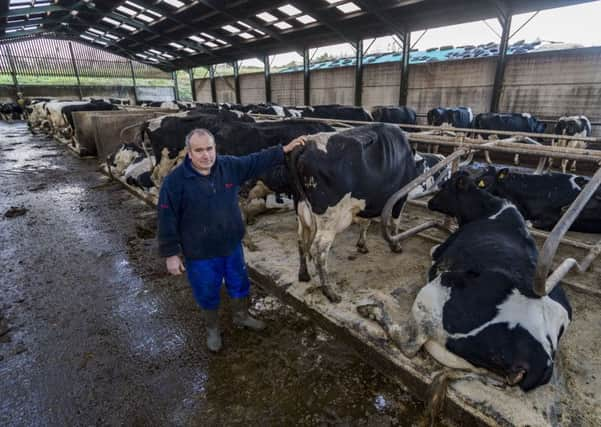Clearly British: Other countries ahead in pursuit of mandatory label rules


The union, which represents more than 55,000 farmers in England and Wales, wants country of origin labelling to be displayed on all food products which contain milk and meat as an ingredient.
NFU leaders wrote to the Government in September to urge Ministers to submit an application to the European Commission to introduce such measures which have already been applied for by other European countries.
Advertisement
Hide AdAdvertisement
Hide AdHelen Hunt, the NFU’s food chain advisor, said: “The NFU would like to see mandatory labelling of dairy products such as cheese, butter and yoghurt to allow consumers to make an educated choice about the food they are buying. A survey conducted by the NFU in May 2016 found that 60 per cent of the public often or always look specifically for British produce when shopping for food.
“Other countries in the EU are introducing national measures that will introduce mandatory labelling for meat and milk in processed products such as cheese, yoghurt and butter. The NFU would like the requirement of mandatory labelling of meat and milk in processed foods to be introduced in the UK. With Brexit on the horizon strong national country of origin labelling will increase the provenance of British product both in the UK and overseas.
“Many retailers go above what is required by law to label the Country of Origin of products through voluntary principles, however these are outdated and many branded products are not labelled.
“The voluntary principles were launched in 2010 so there are some areas that need updating to bring them up to date with the latest EU regs and they don’t include trends like online shopping.
Advertisement
Hide AdAdvertisement
Hide Ad“At the moment we are asking government to put in an application to the EU to introduce mandatory labelling of processed products, as we believe this could be the start of strong national country of origin legislation.”
The French government has already applied to the EU for the freedom to impose mandatory rules, and it is now implementing a two-year trial of country of origin labelling for meat and milk in processed products.
After France took the initiative, other European countries including Italy, Lithuania and Portugal have submitted applications of their own.
Each application triggers a three-month waiting period in which the European Commission can comment.
Advertisement
Hide AdAdvertisement
Hide AdMs Hunt added: “Clear, reliable country of origin labelling will help consumers make informed choices about the products they are buying. British farmers are proud of what they produce and clear, consistent and unambiguous labelling will showcase British products on the shop floor.”
Shaun Sowray supplies milk from 450 dairy cattle at Bowes Green Farm in Bishop Thornton near Harrogate, which he runs in partnership with his brothers Peter and Paul, to nearby Payne’s Dairies, and he is backing The Yorkshire Post’s Clearly British campaign.
“Dairy labelling is very ambiguous as it stands,” Mr Sowray said.
As part of our campaign, we are calling for a UK logo or label, or the Union flag, only to be used on dairy products made with milk that comes just from cows that are milked in Britain, and for greater take up of the Red Tractor logo which is the only guarantee that a dairy product is made using just British milk.
Advertisement
Hide AdAdvertisement
Hide AdMr Sowray believes retailers do not prioritise local provenance like their customers do.
“Consumers seem to be very supportive of British food but supermarkets, no matter who they are, seem to go in for far cheaper options for abroad.”
The Clearly British campaign was launched in the midst of an ongoing dairy cash crisis which is driving dairy farms out of business. Clear labels would make it easier for shoppers to buy British and could increase returns for farmers as a result.
Mr Sowray said the low farmgate prices of the past two years had been hard to stomach.
“We are effectively getting what we were getting 25 years ago. We keep getting told to cut the cost of production by the experts but why can’t we get a fair price for what we produce?”